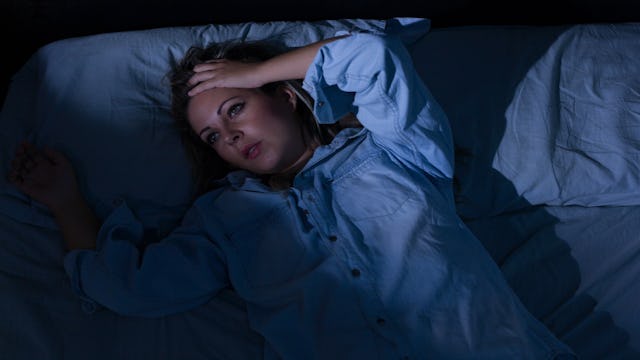This Is The Hell That Is Parenting With Insomnia

I always thought insomnia was for other people. People who have a unique body clock which seems to allow them to get by on (or even thrive with) less than the average recommended 7-8 hours of sleep a night. I never thought of insomnia as a serious medical condition, but more of an “Oh, I couldn’t sleep last night because I had so much on my mind” type of thing.
I would hear others mention how their insomnia was acting up, and they’re kinda tired today, but that it was something they’d grown accustomed to. I also thought insomnia only hit people who already suffer from some type of anxiety, depression, or maybe are the “nervous” type, and that it was something that’s temporary, and eventually goes away on its own.
I thought all of those things until one night I found myself staring into the darkness of my room at 3 a.m. WIDE THE HELL AWAKE, and wondering what the hell happened to the normal, healthy 8 hours of sleep a night I had been getting for years?
Insomnia happened, and unbeknownst to me, it can strike randomly at any time, at any age, and for a variety of different reasons. Besides the fact that it’s a royal pain in the sleepless ass because there is nothing decent on TV at 3 a.m., it wreaks absolute havoc on your parenting the next day. And the next day. And the next.
When you’re being awoken by a hungry baby or sick child, it’s almost as if you can understand the loss and lack of sleep, and convince yourself it’s only a phase. But when insomnia strikes, it brings with it a relentless cycle of anxiety and worry about the next night’s sleep, and the next, and the next. And somehow the fact that it’s your own body causing the sleepless nights makes it all the worse, because now yours is the only body to blame.
For most people, insomnia is usually temporary, and is the result of some life change or emotional situation. It’s called short term or “acute insomnia,” and accompanies things like divorce, loss of job, new job, death in the family, change in family structure (like a kid leaving for college), or a move to a new home or town. Generally it will last three months and resolve on its own.
But, unfortunately, for many others, it is chronic insomnia — which is defined as having difficulty sleeping at least three nights a week for at least three months. Those sleepless nights are most likely caused by major stresses, general poor health, use of caffeine, alcohol, or nicotine at night, side effects from medication, or mental health issues.
My insomnia started when my son left for college and coincided with peri-menopausal changes happening with my body, which turned out to be a wonderful recipe for being 100% alert, ready, awake, and eager to start my day at around 3 a.m. That type of insomnia — called maintenance insomnia — is when you are able to fall asleep easily, but staying asleep (or falling back to sleep) is difficult.
Often, after two hours of middle-of-the-night wakefulness, I would finally be able to drift back off to sleep, only to have the alarm go off about 30 minutes later. Any insomnia — no matter the form or duration — not only makes mornings challenging, but makes the whole damn day miserable.
We already know when you don’t get enough sleep, shit hits the fan big time. You sleepwalk through your entire day at work probably hiding behind your desk — maybe even napping on your lunch break. But when you’re tasked with being the primary childcare provider for small kids during daytime hours, sleep deprivation can be brutal in terms of your patience, temper, mood — hell, everything.
Pushing a kid on a swing at the park feels like running a marathon. Hearing “Mommy, Mommy, Mommy” 150 times a day feels like woodpecker is tapping on your brain, and trying to drive kids to and from school and to after-school activities is absolute torture — especially since by 4 p.m., you’ve already been awake for 13 hours straight. And I haven’t even gotten to the hell that is dinner-making and the bedtime routine yet, which is usually when your eyelids feel like they weigh 500 pounds and your whole body is about five seconds away from collapsing.
Whatever type of insomnia you may be suffering from, and whatever reason may be causing it, there are remedies — behavioral, homeopathic, and, of course, medicinal — that can and do help. But aside from trying to manage it on your own or with your doctor, don’t shy away from managing it within your family. If you had a cold, you’d be fine with explaining to a child what you have and how you’re feeling, and the same can be done with insomnia. Children are capable of understanding that lack of sleep is a type of sickness, and the whole family can help Mom feel better if we work together to make some adjustments.
It’s also an ideal time to talk about the importance of sleep with your kids, so they can learn to recognize when they may be having sleep issues, and will feel more at ease to come to you and seek help if it feels more “normal” to do so — kinda like Mom did.
If I’ve learned one thing in 20 years of parenting, it’s that when Mom has had a great night’s sleep, everyone has a great next day. Make it a priority starting today. Get help if you need, and for more information on insomnia and its treatments, visit The National Sleep Foundation.
This article was originally published on